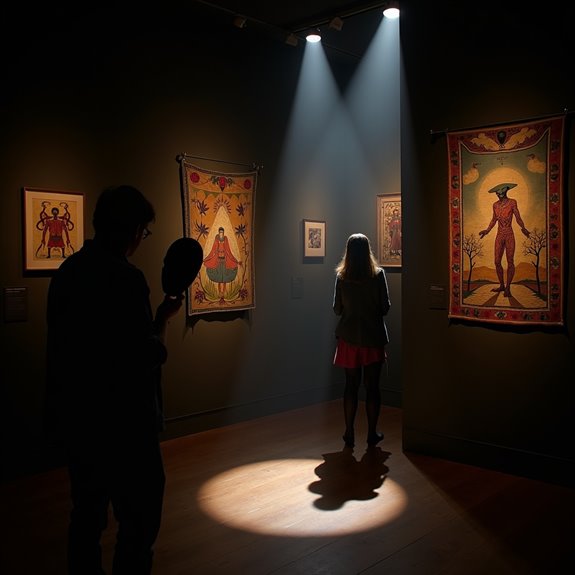Are Abduction Stories Consistent Across Cultures?
Abduction stories often echo similar themes worldwide, capturing a blend of fear and hope. These narratives, whether rooted in supernatural or extraterrestrial encounters, reveal shared human anxieties about the unknown. Despite distinct cultural flavors, the core sentiments of loss and transformation remain strikingly consistent. This raises intriguing questions about our collective consciousness and its reflections in these tales. What drives these parallels, and how do they shape our understanding of the cosmos?
Introduction

Throughout history, cultures around the world have shared intriguing abduction stories that reflect their unique beliefs and values. These narratives often feature supernatural beings, mythical figures, or even gods, illustrating societal fears and hopes. In many societies, abduction tales serve as cautionary lessons, warning against straying too far from community ethics or spiritual paths. For instance, some stories highlight the consequences of disobedience, while others reveal deeper insights into human nature and morality. The settings and characters shift markedly across cultures, but the core themes of loss, redemption, and transformation remain constant. Such abduction stories not only captivate listeners but also offer reflections on the human condition, bridging the gap between reality and the fantastical domains of imagination.
Cultural Narratives of Extraterrestrials

Abduction narratives often extend beyond earthly domains, embracing themes of extraterrestrial encounters that have emerged in various cultures. These stories reflect unique social anxieties and cultural beliefs, shaping how societies interpret the unknown. In some cultures, extraterrestrial beings symbolize harm or disruption, often linked to fears of imperialism or technological advancement. Others present these beings as benevolent, representing hope for enlightenment or progress. For instance, in Japanese folklore, celestial beings frequently impart wisdom, while Western narratives often highlight abductions filled with medical experimentation. Overall, cultural perspectives on extraterrestrials reveal underlying values and fears. By analyzing these diverse accounts, scholars gain insights into human psychology, mythology, and society’s evolving relationship with the cosmos, illuminating the intricate ties between culture and the notion of the extraterrestrial.
Notable Cases or Sightings

While many cultures share tales of mysterious encounters, certain notable cases and sightings stand out, capturing public fascination and sparking intense debate. One of the most famous is the 1973 Pascagoula Abduction in Mississippi, where two men claimed they were taken aboard a UFO by humanoid beings. Similarly, the 1980 alien encounter in the Rendlesham Forest in England drew both military witnesses and skeptics alike. In Brazil, the 1977 Colares incidents saw multiple residents reporting strange lights and apparent abductions, resulting in widespread panic. These cases often share striking similarities, yet each represents unique cultural interpretations and witness accounts. As they circulate in popular media, they continue to ignite discussions about the possibility of extraterrestrial life.
Common Theories or Explanations
Many researchers and enthusiasts have proposed various theories to explain abduction phenomena, aiming to make sense of these perplexing accounts. Some suggest psychological factors like sleep paralysis or hypnagogic hallucinations as potential explanations, pointing to the subject’s altered state of consciousness. Others argue that cultural narratives influence perceptions of abduction, leading people to interpret their experiences through local legends or myths. Some scientists explore extraterrestrial theories, suggesting visitors from other worlds may intentionally interact with humans. Additionally, sociologists examine the role of media in shaping abduction stories, claiming that increased exposure can lead to imitation or fabricated accounts. Each theory attempts to unravel the complex tapestry of human experience surrounding these mysterious encounters, offering insight into why they resonate across cultures.
Frequently Asked Questions
How Do Abduction Stories Affect Mental Health in Experiencers?
Abduction stories often leave experiencers feeling anxious and isolated. They struggle with trust issues and fear of judgment from others. Many report heightened distress, impacting their mental health and overall well-being considerably over time.
Are There Common Symbols in Abduction Experiences Worldwide?
Many abduction experiences share common symbols, like bright lights, tall beings, and medical examinations. These elements resonate across cultures, reflecting deep-seated fears and curiosities about the unknown, even if their interpretations may vary.
Do Abduction Stories Appear in Ancient Texts or Folklore?
Abduction stories commonly appear in ancient texts and folklore worldwide. Many cultures recount tales of mysterious disappearances, often involving supernatural beings. These narratives reveal humanity’s longstanding fascination with the unknown and the fear of being taken. do fairy abductions explain disappearances? As we delve deeper into these stories, we find that they often blur the lines between reality and myth. This intrigue raises questions about our perceptions of safety and the unseen forces at play in our lives. The allure of the fantastical may serve as a lens through which we examine our fears and the mysteries that still linger in the shadows of our world.
How Do Skeptics Interpret Abduction Experiences Culturally?
Skeptics often view abduction experiences culturally as manifestations of shared psychological phenomena. They argue societal anxieties, myths, and cultural narratives shape these stories, highlighting how different backgrounds influence people’s interpretations of similar experiences.
Can Abduction Accounts Influence Popular Media and Entertainment?
Abduction accounts greatly influence popular media and entertainment, inspiring filmmakers and authors alike. Their themes resonate with audiences, shaping narratives that explore fear, mystery, and the unknown, ultimately creating fascinating stories that engage viewers and readers.


